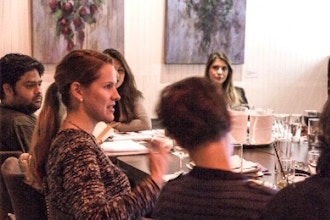What is Poetry? Poetics, Language, and Feeling
- All levels
- 21 and older
- $315
- Earn 3,150 reward points
- Price Lock Guarantee
- Online Classroom
- 12 hours over 4 sessions
Thankfully we have 6 other Lecture Classes for you to choose from. Check our top choices below or see all classes for more options.
Brooklyn Institute for Social Research @ Online Classroom
Embark on a riveting exploration of trust, deceit, and existential uncertainty in Herman Melville’s masterpiece. Join us as we dissect The Confidence-Man, delving into its satire of capitalist modernity and probing questions of faith, knowledge, and societal norms.
May 5th
2–5pm EDT
Meets 4 Times
Brooklyn Institute for Social Research @ Online Classroom
Delve into the profound intersections of race, class, and capitalism in a thought-provoking exploration of contemporary radical movements. Join us for an in-depth examination of Cedric Robinson’s concept of racial capitalism and its implications for understanding modernity, nationalism, and Black Radicalism.
May 7th
6:30–9:30pm EDT
Meets 4 Times
Brooklyn Institute for Social Research @ Online Classroom
Embark on a captivating exploration of Mesopotamian civilization through archaeology and material culture. Join us as we delve into the origins, structures, and legacy of this ancient society, unraveling its significance amidst historical interpretations and contemporary geopolitical contexts.
May 8th
6:30–9:30pm EDT
Meets 4 Times
Brooklyn Institute for Social Research @ Online Classroom
Delve into the complex terrain of pregnancy politics, exploring gestational labor, abortion rights, and reproductive justice. Join us for a deep dive into theoretical frameworks, historical perspectives, and contemporary debates surrounding the manufacture of human fetuses.
May 12th
2–5pm EDT
Meets 4 Times
Brooklyn Institute for Social Research @ Online Classroom
Uncover the entwined history of psychoanalysis and state power in a captivating exploration of repression tactics. Join us as we delve into the intersections of Freudian theory with military strategy, urban policing, and guerrilla warfare.
May 12th
2–5pm EDT
Meets 4 Times
What is poetry, and what is it good for? Today, poetry is often pronounced dead. Yet at the same time, we remain, to cite the New York Times, “poetry curious.” We sense, as Aimé Césaire sensed, that poetry encompasses some “greater feeling” that goes uncaptured by scientific classification and explanation. For Audre Lorde, poetry is that “illumination,” which is “already felt,” and yet “formless, about to be birthed.” But how does poetry work? Why is it structurally so different from prose, and what does that have to do with its capability to illuminate, to convey and express notions and sensations otherwise inexpressible in ordinary, practical language? The critic David Orr says poetry is “beautiful and pointless.” But doesn’t poetry have a point?
In this course, an introduction to Poetry and Poetics, we’ll develop our own languages for thinking and feeling with poetry. We’ll examine the formal characteristics of poetry, different poetical modes and devices—from epic to lyric to free verse—and the reception and uses of poetry across time and space, paying particular attention to our contemporary moment. What is (and was) the relationship between poetry and politics, or for that matter, social life? How does poetry move us beyond the scope of Cartesian thought and closer to human experience? Readings will be drawn primarily, though not exclusively, from the twentieth and twentieth centuries, and may include poetry and essays from Percy Bysshe Shelley, William Blake, Aimé Césaire, Audre Lorde, Lyn Hejinian, Myung Mi Kim, Charles Bernstein, Adrienne Rich, Douglas Kearney, and Simone White, among others.
This course is available for "remote" learning and will be available to anyone with access to an internet device with a microphone (this includes most models of computers, tablets). Classes will take place with a "Live" instructor at the date/times listed below.
Upon registration, the instructor will send along additional information about how to log-on and participate in the class.
In any event where a customer wants to cancel their enrollment and is eligible for a full refund, a 5% processing fee will be deducted from the refund amount.

People who viewed this class also viewed the following classes
Get quick answers from CourseHorse and past students.
The Brooklyn Institute for Social Research was established in 2011 in Boerum Hill, Brooklyn. Its mission is to extend liberal arts education and research far beyond the borders of the traditional university, supporting community education needs and opening up new possibilities for scholarship in the...
Read more about Brooklyn Institute for Social Research

This school has been carefully vetted by CourseHorse and is a verified Online educator.

Booking this class for a group? Find great private group events
Secure your booking now and we'll match any price drop within 48 hours across all booking platforms, ensuring you never miss out on savings!
Maximize your savings with every purchase. Unlock rewards on every transaction, ensuring you get the most value out of your experience!
Enjoy hassle-free transactions without worrying about additional charges. With us, what you see is what you pay - no surprises!
Discover a curated selection of courses handpicked by experts in the field. Dive into quality content that suits your learning needs and interests!



More in Life Skills




Get special date and rate options for your group. Submit the form below and we'll get back to you within 2 business hours with pricing and availability.